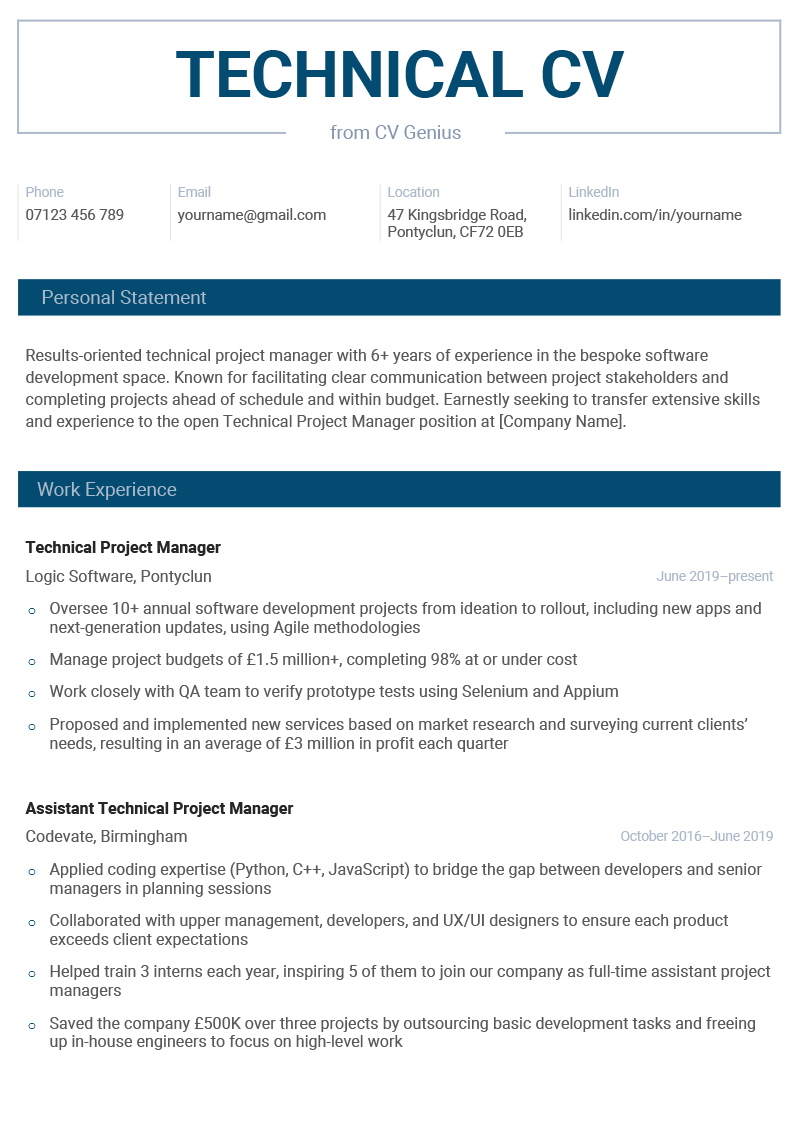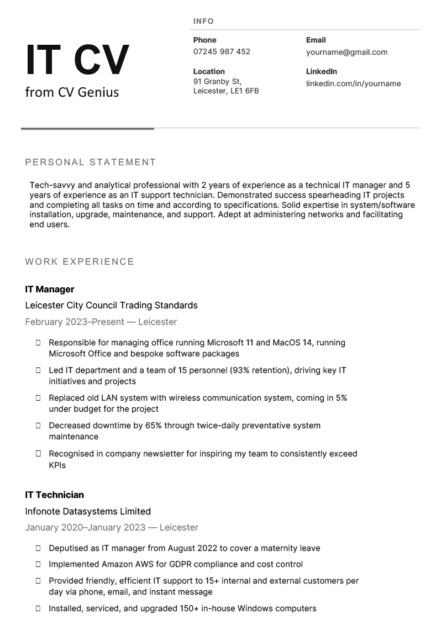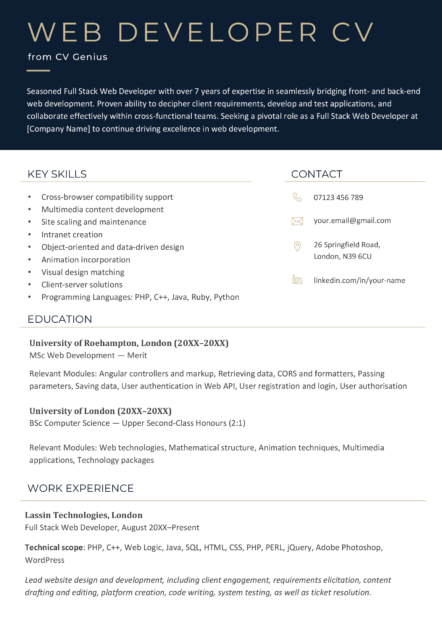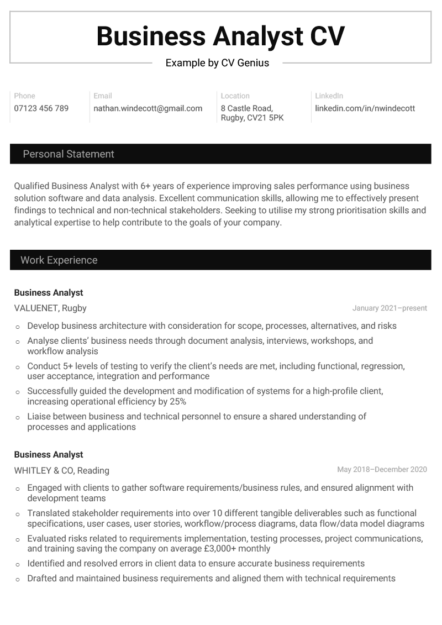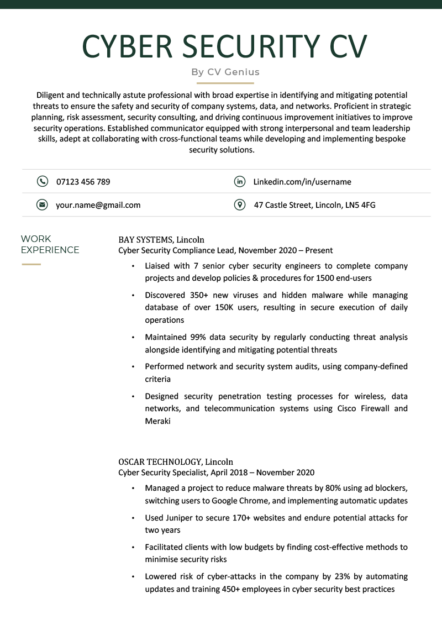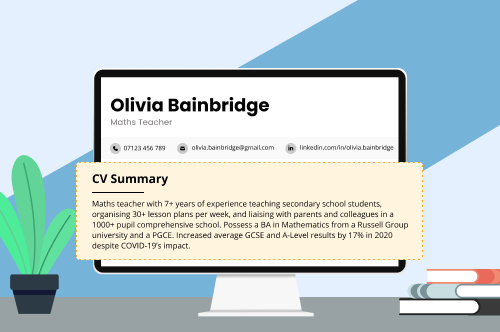Ensure your CV layout is structured to best highlight your unique experience and life situation.
Technical CV Template (Text Format)
PERSONAL STATEMENT
Results-oriented technical project manager with 6+ years of experience in the bespoke software development space. Known for facilitating clear communication between project stakeholders and completing projects ahead of schedule and within budget. Earnestly seeking to transfer extensive skills and experience to the open Technical Project Manager position at [Company Name].
WORK EXPERIENCE
Technical Project Manager
Logic Software, Pontyclun, June 2019–present
- Oversee 10+ annual software development projects from ideation to rollout, including new apps and next-generation updates, using Agile methodologies
- Manage project budgets of £1.5 million+, completing 98% at or under cost
- Work closely with QA team to verify prototype tests using Selenium and Appium
- Proposed and implemented new services based on market research and surveying current clients’ needs, resulting in an average of £3 million in profit each quarter
Assistant Technical Project Manager
Codevate, Birmingham, October 2016–June 2019
- Applied coding expertise (Python, C++, JavaScript) to bridge the gap between developers and senior managers in planning sessions
- Collaborated with upper management, developers, and UX/UI designers to ensure each product exceeds client expectations
- Helped train 3 interns each year, inspiring 5 of them to join our company as full-time assistant project managers
- Saved the company £500K over three projects by outsourcing basic development tasks and freeing up in-house engineers to focus on high-level work
EDUCATION
University of Birmingham, Birmingham
BSc (Hons) Computer Science, September 2013–October 2016
- Upper second-class honours (2:1)
- Relevant Modules: Data Structure & Algorithms, Software Engineering and Professional Practice, Security and Networks, Security of Real-World Systems
Edgbaston High School for Girls, Birmingham
July 2006–June2013
- A-Levels: Computing (A), Maths (A), Business (A)
- GCSEs: 10 A*–C, including English, Maths, and ICT
ADDITIONAL SKILLS
- Project management certifications: PRINCE2, Certified Scrum Professional (CSP)
- Programming languages: JavaScript, Python, C++, SQL
- Software expertise: AutoCAD, Selenium, Appium, and Microsoft SQL Server
- Skilled at managing remote teams via Slack, Zoom, and Google Workspace
- Bilingual, fluent in English and French
- Excellent communication, problem-solving, and organisational skills
HOBBIES & INTERESTS
- Blogging about tech news and video games
- Playing various sports with friends
- Reading and watching science fiction
- Tending to vegetable and flower gardens
How to write a good technical CV
Before you begin writing, make sure you know how to write a CV in a way that best emphasises your strengths.
A technical CV is a specific type of application document used by technical professionals, such as:
- engineers
- scientists
- IT project managers
- technical support professionals
- technical writers
There’s currently a shortage of IT professionals in the UK. So now’s a great time to get into the industry, as wages rise to meet the demand for workers with tech skills. To capitalise on the situation, you’ll need to make a CV that shows employers you’ve got the skills and experience they’re willing to pay for.
Here are three tips on how to write a good technical CV:
1. Showcase your hard and soft technical skills
When you apply for a job in a technical field, showcase your hard and soft skills on your CV to show recruiters you’re a well-rounded applicant who can both do the work and fit into the company culture.
Your hard skills are the specific, quantifiable technical skills that you’ve acquired through education or experience — your computer skills, for instance. Meanwhile, your soft skills are abilities that come naturally to you and are difficult to teach or measure. Your interpersonal skills are examples of soft skills.
One way to showcase your hard skills is to give examples of how you’ve used specific software programs or coding languages to complete projects in your CV work experience section’s bullet points. You can also include information about any relevant certifications or licences that you hold when you write your CV’s education section.
Here are more examples of hard skills to highlight on your tech CV, depending on your role:
- Cloud computing
- Artificial intelligence
- Cybersecurity
- Analytics
- IT skills
Your soft skills are just as important as your hard skills because many of the most essential tasks in technical fields require strong people skills.
For example, being able to communicate with team members, clients, and customers effectively is critical for many technical jobs. Other important soft skills include:
- problem solving
- critical thinking skills
- creativity
- leadership
- attention to detail
As with hard skills, you should showcase your soft skills on your CV by providing concrete examples of how you’ve used them in past roles. Here are three bullet points from a technical project manager’s CV that give specific examples of the applicant’s teamwork, communication, and training skills:
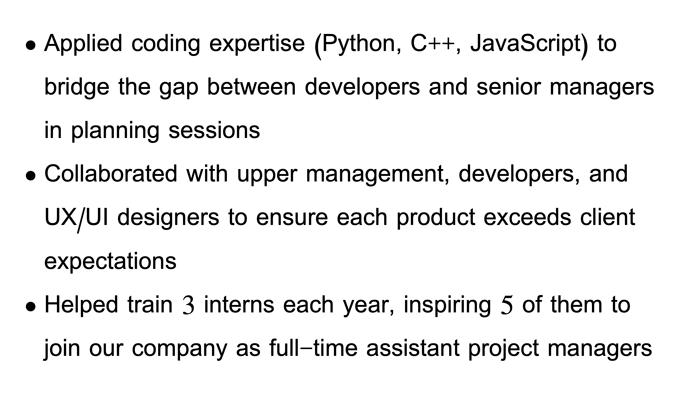
2. Choose the best format for your technical CV
The two main formats you can choose between for your technical CV are the chronological format and skills-based format. Which CV format you pick depends on your work history and skillset. Let’s take a closer look at each option:
Chronological CV format
The chronological CV format is the most-used option, as it lists your technical work experience in reverse chronological order (starting with your most recent position and working backwards). This format is a good choice if you want to showcase your tech career progression.
Skills-based CV format
Skills-based CVs focus on highlighting your skillset rather than your work history. Use the skills-based format if you don’t have much relevant work experience, are changing careers, or have employment gaps.
The skills-based format also allows you to highlight any transferable skills you’ve acquired through other experiences, such as volunteering or personal projects.
When using this format, focus on showcasing the tech skills related to the role you’re applying for. Recruiters only want to see job-relevant information on your technical .
Ultimately, the best CV format for you is based on your circumstances. Consider your work history and skillset, and choose the option that best showcases your job-specific technical abilities.
3. Include hard numbers to make your technical CV stand out
Putting hard numbers on your technical CV presents your skills and achievements in a measurable way. Also, adding numbers sets you apart from other candidates who have similar qualifications but only listed job duties on their CVs.
So when you write your tech CV, use hard numbers to:
- quantify your achievements (for example, increasing sales or decreasing costs by a certain percentage)
- demonstrate your skills (like the number of hours you spend coding per week or the amount of money you manage)
- back up any claims you make about yourself (for instance, if you say you’re an expert in a certain software program, include the number of years you’ve been using it or the number of projects you’ve completed with it)
By quantifying your achievements on your technical CV, you can demonstrate exactly what you’re capable of and show employers that you’re the right person for the job.
You also need to quantify your technical cover letter. And if you’re great at numbers but not at writing, don’t worry — you can use a cover letter builder that takes care of the writing for you.
